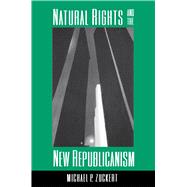
Note: Supplemental materials are not guaranteed with Rental or Used book purchases.
Purchase Benefits
Looking to rent a book? Rent Natural Rights and the New Republicanism [ISBN: 9780691059709] for the semester, quarter, and short term or search our site for other textbooks by Zuckert, Michael P.. Renting a textbook can save you up to 90% from the cost of buying.
| Preface | xi | (2) | |||
| Acknowledgments | xiii | (2) | |||
| INTRODUCTION | xv | ||||
| PROLOGUE | 3 | (24) | |||
| Two Revolutions, Two Declarations | 4 | (10) | |||
| Contract and the Declaration of Rights | 14 | (1) | |||
| Locke and the Two Revolutions | 15 | (3) | |||
| Locke and the Americans | 18 | (9) | |||
| PART ONE: Protestants | 27 | (68) | |||
|
29 | (20) | |||
|
30 | (4) | |||
|
34 | (5) | |||
|
39 | (4) | |||
|
43 | (6) | |||
|
49 | (28) | |||
|
51 | (5) | |||
|
56 | (8) | |||
|
64 | (1) | |||
|
65 | (6) | |||
|
71 | (6) | |||
|
77 | (18) | |||
|
79 | (4) | |||
|
83 | (6) | |||
|
89 | (2) | |||
|
91 | (4) | |||
| PART TWO: Whigs | 95 | (90) | |||
|
97 | (22) | |||
|
98 | (3) | |||
|
101 | (5) | |||
|
106 | (7) | |||
|
113 | (3) | |||
|
116 | (3) | |||
|
119 | (31) | |||
|
119 | (4) | |||
|
123 | (3) | |||
|
126 | (3) | |||
|
129 | (5) | |||
|
134 | (12) | |||
|
146 | (4) | |||
|
150 | (35) | |||
|
152 | (3) | |||
|
155 | (4) | |||
|
159 | (5) | |||
|
164 | (2) | |||
|
166 | (4) | |||
|
170 | (5) | |||
|
175 | (10) | |||
| PART THREE: Natural Rights and the New Republicanism | 185 | (136) | |||
|
187 | (29) | |||
|
188 | (7) | |||
|
195 | (9) | |||
|
204 | (3) | |||
|
207 | (9) | |||
|
216 | (31) | |||
|
216 | (6) | |||
|
222 | (8) | |||
|
230 | (4) | |||
|
234 | (6) | |||
|
240 | (7) | |||
|
247 | (42) | |||
|
248 | (4) | |||
|
252 | (7) | |||
|
259 | (13) | |||
|
272 | (3) | |||
|
275 | (12) | |||
|
287 | (2) | |||
|
289 | (32) | |||
|
291 | (6) | |||
|
297 | (8) | |||
|
305 | (7) | |||
|
312 | (9) | |||
| Notes | 321 | (56) | |||
| Bibliography | 377 | (14) | |||
| Index | 391 |
The New copy of this book will include any supplemental materials advertised. Please check the title of the book to determine if it should include any access cards, study guides, lab manuals, CDs, etc.
The Used, Rental and eBook copies of this book are not guaranteed to include any supplemental materials. Typically, only the book itself is included. This is true even if the title states it includes any access cards, study guides, lab manuals, CDs, etc.